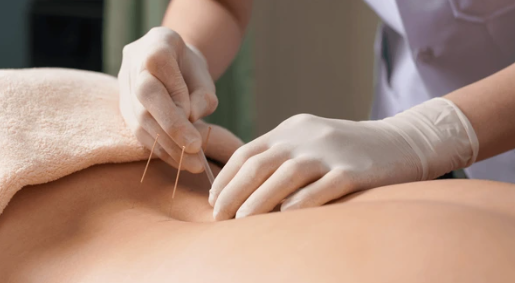Introduction
Acupuncture is a therapeutic practice that originated in ancient China and is known for its ability to tap into the body’s natural healing powers. It is rooted in Traditional Chinese Medicine (TCM) and involves inserting thin needles into specific points on the body to restore balance and promote health.
This practice has been around for almost two thousand years and is based on the belief that pain and illness are indications of an imbalance in the body’s natural equilibrium.
In modern healthcare, acupuncture is widely used to promote overall well-being and treat various conditions. It is valued not only for its physical advantages but also for its ability to address emotional and mental aspects, demonstrating a comprehensive approach to health. Many people seek acupuncture as a solution for chronic pain, assistance with fertility treatments, and even for improving mental well-being.
While acupuncture itself provides numerous benefits, it can also be complemented by other holistic therapies like reflexology. Incorporating reflexology techniques alongside acupuncture can enhance the overall treatment experience by targeting specific pressure points on the feet that correspond to various organs and systems within the body.
Acupuncture can also play a significant role in helping individuals overcome traumas or phobias. By stimulating certain points in the body, this therapy can assist in alleviating anxiety associated with traumatic experiences or intense fears. To delve deeper into this aspect, exploring how acupuncture can aid in treating traumas or phobias would provide valuable insights.
How Does Acupuncture Work?
Acupuncture works by stimulating specific points on the body, known as acupoints, to restore balance and enhance the body’s natural healing abilities. These acupoints are connected by pathways called meridians, which affect different bodily functions.
- Influence on the Central Nervous System
Acupuncture also affects the central nervous system (CNS), which is responsible for transmitting signals between the body and the brain. By inserting thin needles into acupoints, acupuncture can regulate nerve activity, leading to changes in pain perception and improved bodily functions.
This stimulation encourages the CNS to release chemicals such as neurotransmitters and endorphins, which have pain-relieving and mood-boosting effects.
- Role of Neurotransmitters and Endorphins
Neurotransmitters like serotonin play a significant role in regulating mood and emotional well-being, while endorphins are known for their pain-relieving properties. When acupuncture triggers the release of these chemicals, it can help alleviate various conditions, especially musculoskeletal problems like osteoarthritis and lower back pain. The increased flow of these substances not only reduces pain but also enhances overall well-being.
Understanding these mechanisms provides a clearer picture of why acupuncture remains a widely accepted complementary treatment in modern healthcare. For instance, aromatherapy is another complementary approach that can be used alongside acupuncture to enhance well-being during cancer treatment. Similarly, neuro-linguistic programming (NLP) can be combined with acupuncture to effectively address phobias by reprogramming negative thought patterns.
The Holistic Approach of Acupuncture in Restoring Balance
Acupuncture offers more than just relief from symptoms. It takes a holistic approach, considering physical, emotional, and energetic imbalances to address the root cause of the problem. This sets acupuncture apart from many other treatments that only target specific symptoms.
Understanding Qi: The Vital Force
Central to Traditional Chinese Medicine (TCM) is the concept of Qi (pronounced ‘chee’), a vital force that flows through the body’s meridians or energy pathways. When Qi flows smoothly, health is maintained. An imbalance or blockage in Qi can lead to illness and discomfort.
Acupuncture works by stimulating specific points along the meridians, promoting the smooth flow of Qi throughout the body. This helps to restore balance and support the body’s natural healing process.
Key Points:
- Holistic Nature: Acupuncture treats both physical symptoms and emotional imbalances. By focusing on the individual’s unique condition rather than just the illness, it offers a comprehensive treatment strategy.
- Qi Flow: The practice of acupuncture revolves around regulating Qi. Needles are strategically placed at specific points to unblock and balance this vital energy.
Acupuncture benefits extend beyond mere symptom relief, addressing the whole person by considering physical, emotional, and energetic imbalances. This holistic approach distinguishes acupuncture from many other therapeutic practices. By treating the body as an interconnected system, acupuncture aims to restore harmony and promote overall well-being.
For those interested in exploring complementary therapies that align with acupuncture’s holistic principles, you might find Indian Head Massage beneficial. This therapy shares similar principles of treating the body as a whole entity by focusing on specific areas that hold tension and stress.
Additionally, seeking expertise from qualified therapists ensures a safe and effective treatment experience, allowing individuals to fully embrace the holistic methodologies employed by these therapies.
Evidence-Based Benefits of Acupuncture Treatment
Extensive research has revealed numerous acupuncture benefits across various health conditions. Here are some key areas where acupuncture has shown effectiveness:
- Pain Management
Research has consistently supported the role of acupuncture in alleviating pain. Multiple studies indicate its efficacy in managing chronic pain conditions such as osteoarthritis and low back pain. Acupuncture’s influence on the central nervous system and endorphin release contributes to its pain-relieving properties.
- Chronic Conditions
Conditions like migraines, fibromyalgia, and rheumatoid arthritis benefit from regular acupuncture sessions. Scientific investigations, including randomized controlled trials, highlight significant reductions in symptom severity and frequency. For instance, a study published in JAMA Internal Medicine demonstrated that acupuncture could reduce the frequency of migraines by up to 50%.
- Mental Health
Acupuncture supports mental well-being by alleviating symptoms of anxiety and depression. Clinical evidence shows that acupuncture can modulate brain chemistry, influencing neurotransmitters like serotonin and dopamine. Patients often report feeling more relaxed and balanced post-treatment.
- Fertility Issues
Acupuncture is increasingly used as a complementary approach to fertility treatments. It helps regulate menstrual cycles, improves ovarian function, and enhances uterine blood flow. Studies also suggest that acupuncture may increase the success rates of in vitro fertilization (IVF).
Exploring Acupuncture for Pain Management
The Use of Acupuncture for Managing Post-Surgical Pain Without Relying Heavily on Opioids
Acupuncture offers a promising alternative to conventional pain management strategies, particularly in the context of post-surgical care. The therapeutic approach aims to alleviate pain without the heavy reliance on opioid pain medicine, reducing the risk of addiction and other adverse effects.
Key Studies Demonstrating the Effectiveness of Acupuncture as an Adjunct Therapy for Chronic Pain Conditions Like Osteoarthritis and Low Back Pain
The research underscores acupuncture’s efficacy as an adjunct therapy for chronic pain conditions such as osteoarthritis and low back pain. Key studies highlight that patients receiving acupuncture report significant reductions in pain levels and improved functional outcomes compared to those receiving standard care alone. These findings support the integration of acupuncture into comprehensive pain management plans.
- One study found that acupuncture significantly reduced chronic low back pain over a 12-week period compared to usual care.
- Another research initiative demonstrated that patients with osteoarthritis experienced notable improvements in joint function and pain relief when incorporating acupuncture sessions into their treatment regimen, as shown in this case study.
By providing a non-pharmacological option for managing both acute and chronic pain, acupuncture contributes to enhanced patient well-being and reduces dependency on opioid medications.
Acupuncture in the Treatment of Mental Health Disorders and Emotional Well-being
The Role of Acupuncture in Reducing Symptoms of Anxiety and Depression
Acupuncture offers potential benefits for mental health, particularly in addressing anxiety and depression. By stimulating specific points in the body, acupuncture can help regulate the body’s stress response and promote relaxation.
Clinical Evidence
- Studies have shown that acupuncture can significantly reduce symptoms of anxiety. Research indicates that acupuncture sessions may lead to a decrease in anxiety levels comparable to conventional treatments.
- For depression, clinical trials have demonstrated that acupuncture can be effective as an adjunct treatment. Patients receiving acupuncture alongside standard care often report greater improvements in mood compared to those receiving standard care alone.
Anecdotal Reports
- Many patients experiencing anxiety or depression have shared positive outcomes following acupuncture treatments. They often report feeling calmer, more balanced, and better able to manage their symptoms.
By tapping into the body’s natural healing processes, acupuncture can provide a holistic approach to mental health care. This integration of physical and emotional well-being aligns with Traditional Chinese Medicine’s philosophy of maintaining balance within the body.
For individuals seeking additional support in managing their mental health, complementary practices such as mindfulness meditation can be beneficial. In fact, combining mindfulness techniques with acupuncture has shown promising results in reducing symptoms of anxiety and depression.
Exploring these topics further, you may find informative articles on our blog that delve into the various aspects of mental health care and holistic well-being.”.
Acupuncture for Enhancing Fertility and Supporting Women’s Health
The Potential Benefits of Acupuncture as a Complementary Approach to Fertility Treatments
Acupuncture has shown promise as a complementary therapy in fertility treatments. Studies indicate that acupuncture may improve blood flow to the reproductive organs, which can enhance ovarian and follicular function. This increased blood flow may help create a more hospitable environment for embryo implantation.
Mechanisms Involved:
- Hormonal Balance: Acupuncture can regulate hormone levels, potentially improving ovulation and increasing the chances of conception.
- Stress Reduction: By alleviating stress and anxiety, acupuncture may positively influence reproductive health, given that high-stress levels can adversely affect fertility.
How Acupuncture Can Help Regulate Menstrual Cycles and Alleviate Common Reproductive Issues Faced by Women
Acupuncture benefits extend to addressing menstrual disorders and other common reproductive issues. Irregular menstrual cycles, painful periods (dysmenorrhea), and conditions like polycystic ovary syndrome (PCOS) can be managed through regular acupuncture sessions.
Specific Benefits:
- Cycle Regularity: Acupuncture helps regulate the menstrual cycle by balancing the endocrine system, which is critical for regular ovulation.
- Pain Management: For those experiencing severe menstrual pain, acupuncture can offer relief by releasing endorphins and reducing inflammation.
- Addressing Underlying Conditions: Conditions such as PCOS or endometriosis can be targeted through specific acupoints that influence hormonal balance and reduce symptoms.
For those interested in exploring acupuncture for fertility or menstrual health, consulting a qualified acupuncturist like Gemma Carver is crucial. Gemma specializes in this field at Marlborough House Therapy Centre. Additionally, couples facing fertility challenges might find it beneficial to combine acupuncture with other forms of support, such as couple counseling, to address both the physical and emotional aspects of their journey.
Understanding the Research Landscape: Clinical Trials on Acupuncture
Conducting rigorous clinical trials to evaluate the efficacy of acupuncture is crucial for validating its therapeutic benefits. These trials offer a structured approach to understanding how acupuncture influences various health conditions, providing a scientific basis for its use. However, clinical trials on acupuncture face specific methodological challenges:
- Control Groups
Establishing suitable placebo or sham acupuncture groups can be difficult, as even minimal needling might produce therapeutic effects.
- Blinding
Ensuring that both practitioners and patients are blinded to the treatment can be complex due to the hands-on nature of acupuncture.
- Outcome Measures
Selecting appropriate and standardized outcome measures that accurately reflect the effects of acupuncture.
Despite these challenges, ongoing research efforts are actively addressing these issues. For instance, studies are increasingly using innovative designs such as crossover trials and employing non-invasive placebo devices like those found at Marlborough House Therapy Centre. These advancements aim to enhance the reliability of findings and mitigate methodological limitations.
Ongoing research also explores new applications and mechanisms behind acupuncture. The future directions in this field include:
- Investigating the role of acupuncture in managing chronic pain conditions.
- Evaluating its effectiveness in treating mental health disorders like anxiety and depression, which individuals can seek help for from professionals.
- Exploring its potential in enhancing fertility treatments and women’s health.
These efforts contribute significantly to building a robust evidence base for acupuncture, ensuring that it remains a credible option within modern healthcare.
Safety Precautions and Potential Side Effects of Acupuncture
Acupuncture, a generally safe practice when performed by a trained practitioner, can have some side effects. While most issues are minor, it’s important to be aware of them:
- Bruising: Minor bruising around the needle insertion sites is not uncommon.
- Dizziness: Some patients may experience lightheadedness or dizziness immediately following the treatment.
To minimize potential risks, practitioners must ensure needle sterility and adhere to proper hygiene practices. The use of sterile, single-use needles significantly reduces the risk of infections and aligns with modern medical standards.
If you’re interested in exploring other holistic treatments that focus on emotional well-being, you may find emotional freedom techniques for anxiety helpful. Additionally, for those seeking alternative pain management methods, hypnotherapy has shown promise in dealing with intractable pain.
In summary, while acupuncture has a favorable safety profile, selecting a qualified acupuncturist who adheres to strict hygiene protocols is essential for minimizing possible side effects and ensuring a safe treatment experience.
Conclusion
Acupuncture offers a holistic therapy option for those seeking alternative treatments for a variety of health conditions. While it presents numerous benefits, it’s essential to remain mindful of its limitations and integrate it with comprehensive medical care when necessary.
Traditional Chinese acupuncture principles continue to guide modern practice and research, ensuring that this ancient art remains relevant in today’s healthcare landscape. By exploring acupuncture, you can tap into a therapeutic approach that not only addresses physical symptoms but also promotes overall well-being.
For further insights and opportunities in the field, you can check out Marlborough House Therapy Centre’s testimonials or explore career opportunities in holistic therapy at their center.



